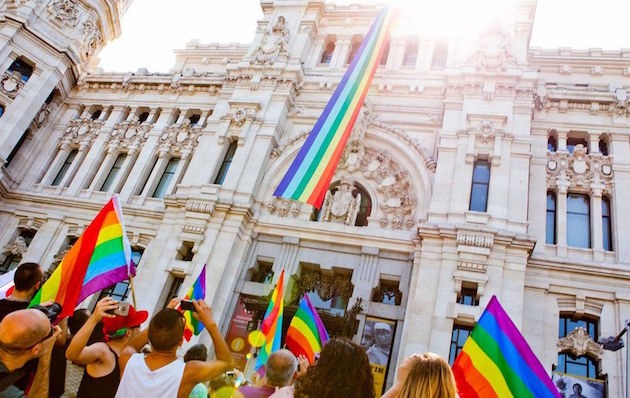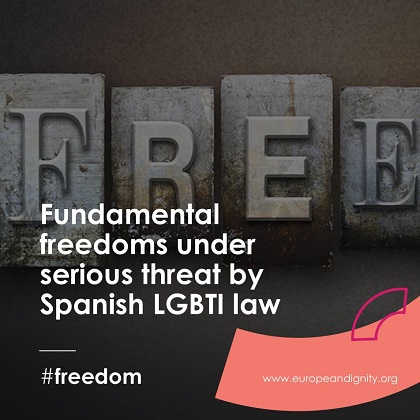Censorship, curbs on self-expression and communications that might be considered offensive, heavy fines for expressing views that could be interpreted as degrading, and having to prove one’s innocence if accused of discrimination.
 A demonstration in favour of the LGBT law in front of Madrid's town hall.
A demonstration in favour of the LGBT law in front of Madrid's town hall.
Censorship, curbs on self-expression and communications that might be considered offensive, heavy fines for expressing views that could be interpreted as degrading, and having to prove one’s innocence if accused of discrimination: All this could become a reality in Spain if a new ‘Equality Bill’ is adopted.
A new LGBTI Non-Discrimination and Equality Bill will go through a first vote in the Spanish Congress on Tuesday, 19 September. Presented in the Spanish Parliament last May by a parliamentary coalition of three leading left-wing parties – Unidos Podemos, En Comú, and En Marea – the bill purports to simply fight discrimination and homophobia. But in fact it seeks to establish “pro-active policies” for the promotion of gender ideology, while also putting in place a heavy-handed “system of offenses and fines” to “guarantee the effectiveness of equality and non-discrimination”.
Concerns about freedom of expression
The Equality Bill “shall ensure that broadcast content and advertisements are respectful towards LGTBI persons [and] … that the media include in their programming, for all ages, the diversity of sexual orientation, identity, and gender expressions, including LGBTI family diversity.” This means that media is likely to be monitored and, if necessary, censored by the state. It also implies that the media may be prevented from transmitting any message that might be considered offensive to any member of the LGBTI community.
If passed, the new law would apply not just to the media but also to “any person, natural or legal, under public or private law, regardless of the administrative or personal situation in which the person is found.” Thus, any actual incident of – or even the mere suspicion of – discrimination against the LGBTI community on the part of a Spanish citizen would be subject to penalties.
This raises the question: How can such drastic consequences be allowed against a person merely on the basis of another person’s subjective perception of discrimination? How can one person know if something they say will be labelled discriminatory by another? In short: How will freedom of expression be protected under the proposed new law?
This freedom is already enshrined in existing documents. The Universal Declaration of Human Rights and the EU Charter of Fundamental Rights both guarantee freedom of expression as a fundamental freedom. Article 10 of the European Convention on Human Rights clearly states that “[e]veryone has the right to freedom of expression. This right shall include freedom to hold opinions and to receive and impart information and ideas without interference by public authority and regardless of frontiers.”
But the proposed new law is in conflict with all this. In fact, a memorandum on Spain’s Equality Bill published by ADF International states that it “undermines freedom of expression and opens the doors to wide-ranging state censorship with onerous penalties for violations.”
Penalties up to €45,000
What kinds of violations are considered sanctionable in the Equality Bill? According to a draft of the proposed legislation, a minor infraction would include “uttering, by any means or method, expressions, images of graphic contents of any kind which are offensive or degrading by reason of sexual orientation, identity, or gender expression or sexual characteristics against LGBTI people or their families.” Repeating such opinions or posting them online make the infractions “serious”.

The penalties for simply expressing such views or opinions range from €3,000 for a single instance up to €20,000 for (a) repeated minor violations, (b) one serious violation, or (c) any violation online – even if it is minor. Moreover, according to Article 96 of the Bill, a citizen found guilty of such violations could be prohibited from receiving any kind of public assistance for up to one year and from contracting with any public entity for a period of one year.
Additionally, the penalties for “very serious offences” can be as high as €45,000. The Equality Bill defines “very serious offences” as “[c]alling for public acts by any means or procedures of any kind that have as their objective to promote, encourage, or incite, directly or indirectly, discrimination, hate or violence against people by reason of sexual orientation, identity, or gender expression or sexual characteristics. Reoffending by publication on the Internet or social media of expressions, images of graphic content of any kind that is offensive or degrading by reason of sexual orientation, identity, or gender expression or sexual characteristics against LGTBI people or their families.” Moreover, secondary penalties – such as temporary disqualification from the provision of public services for a period of up to two years – can also be imposed.
According to ADF International, “not only would unpopular, offensive, or disturbing views be purged from public life and from the online sphere, but the Equality Bill would ensure that the perpetrator is not in the position to express his or her view anymore”.
A reversal of the burden of proof
The Equality Bill also raises questions about how the presumption of innocence – a basic principle in criminal law – will be safeguarded. ADF International points out that the proposed law shifts the burden of proof: “Consequently, a person accused of ‘discrimination’ is forced to prove his or her innocence, whereas any person claiming to have been a victim of discrimination would be presumed to be such. It is almost impossible for a defendant to disprove that their actions did not ‘degrade’ or ‘offend’ the alleged victim, because the only standard for assessing this is the alleged victim’s own subjective perception.”
The Equality Bill thus erodes the presumption of innocence, eliminates the equality of all before the law, and generates legal uncertainty – especially when combined with the grounds of discrimination it considers. These are very vague and subjective, and are based on loose terms such as ‘felt identity’, ‘trans identity’, and ‘identity freely determined’.
This is not just about Spain ...
In a recent article, EDW emphasized the fact that in a truly democratic society, citizens should be able to freely express their ideas and opinions, even if certain individuals or groups dislike or are offended by such ideas and opinions. In fact, it is prerogative of healthy democratic societies that speech will not be banned – even if and when someone profoundly disagrees with its content, or finds it ‘offensive’ or ‘disturbing’. In democratic societies, the free exchange of divergent and opposing views leads to more meaningful public debate, engages citizens in the democratic process, and invigorates democratic deliberation. If Spain adopts the LGBTI Bill, all this would be undermined.
 Roxana Stanciu.
Roxana Stanciu. Several Spanish and international organisations have already expressed concerns about the Equality Bill. They warn that, if adopted, it could set a legal precedent in Europe that could then lead to similar attempts being tried in other EU member states. This underscores the importance of informing the public in Spain and elsewhere about the dangers of the proposed bill and its potential impact on freedom of expression.
We consider other areas on which the Equality Bill could have a serious deleterious impact in our next article.
Roxana Stanciu, Executive Director of European Dignity Watch.

Las opiniones vertidas por nuestros colaboradores se realizan a nivel personal, pudiendo coincidir o no con la postura de la dirección de Protestante Digital.
Si quieres comentar o